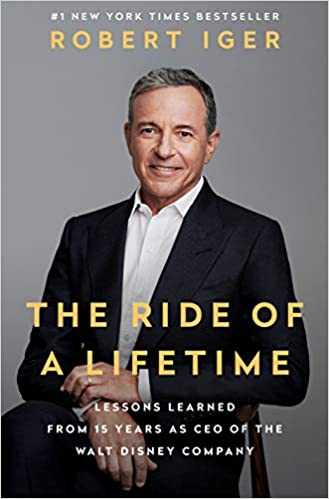The Ride of a Lifetime: Lessons Learned from 15 Years as CEO of the Walt Disney Company
by: Robert Iger
Check out the book on Amazon | your public library.
17 Highlights | 11 Notes
Focus. Allocating time, energy, and resources to the strategies, problems, and projects that are of the highest importance and value is extremely important, and it's imperative to communicate your priorities clearly and often.
Innovate or die, and there's no innovation if you operate out of fear of the new or untested
The first rule is not to fake anything. You have to be humble, and you can't pretend to be someone you're not or to know something you don't. You're also in a position of leadership, though, so you can't let humility prevent you from leading.
The task was to not let me ego get the best of me. Rather than trying too hard to impress whoever was across the table, I needed to resist the urge to pretend I kniw what I was doing and ask a lot of questions.
I didn't want to be in the business of playing it safe. I wanted to be in the business of creating possiblities for greatness.
It's a hard thing to do, especially in the moment, but those instances in which you find yourself hoping that something will work without being able to convincingly explain to yourself how it will work — that's when a little bell should go off, and you should walk yourself through some clarifying questions. What's the problem I need to solve? Does this solution make sense? If I'm feeling doubt, why? Am I doing this for sound reasons or am I motivated by something personal?
I've been asked a lot over the years about the bestt way to nurture ambition — both one's own and that of the people you manage. As a leader, you should want those around you to be eager to rise up and take on more responsibility, as long as dreaming about the job they want doesn't distract from the job they have. You can't let ambition get too far ahead of opportunity.
It's important to know how to find the balance — do the job you have well; be patient; look for opportunities to pitch in and expand and grow; and make yourself one of the people, through attitude and energy and focus, that your bosses feel they have to turn to when an opportunity arises. Conversely, if you're a boss, these are the people to nurture — not the ones who are clamoring for promotions and complaining about not being utilized enough bu the ones who are proving themselves to be indispensable day in and day out.
It's a tricky thing, moving people over to your side and enlisting their enthusiastic engagement. Sometimes it's worth talking through their reservation and patiently responding to their concerns. Other times you simply need to communicate that you're the boss and you wnat this done. It's not that one approach is &ldsquo;nice&rdsquo; and the other isn't. It's just that one is more direct and nonnegotiable. It really comes down to what you believe is right for the moment — when a more democratic approach is useful both in getting to the best outcome and in building morale, and when you have enough certaintly in your opinion that you're willing to be an autocrat even in the face of disagreement.
... but also the about the need to steer clear of anger and anxiety over the things you can't control. I can't overstate how important it is to keep blows to the ego, real as they often are, from occupying too big a place in your mind and sapping too much of your energy. It's easy to be optimistic when everyone is telling you you're great. It's much harder, and much more necessay, when your sense of yourself is being challenged, and in such a public way.
People sometimes shy away from taking big swings because they assess the odds and build a case against trying something before they even take the first step. One of the things I've always instinctively felt — and something that was greatly reinforced working for people like Roone and Michael — is that long shots aren't usually as long as they seem.
